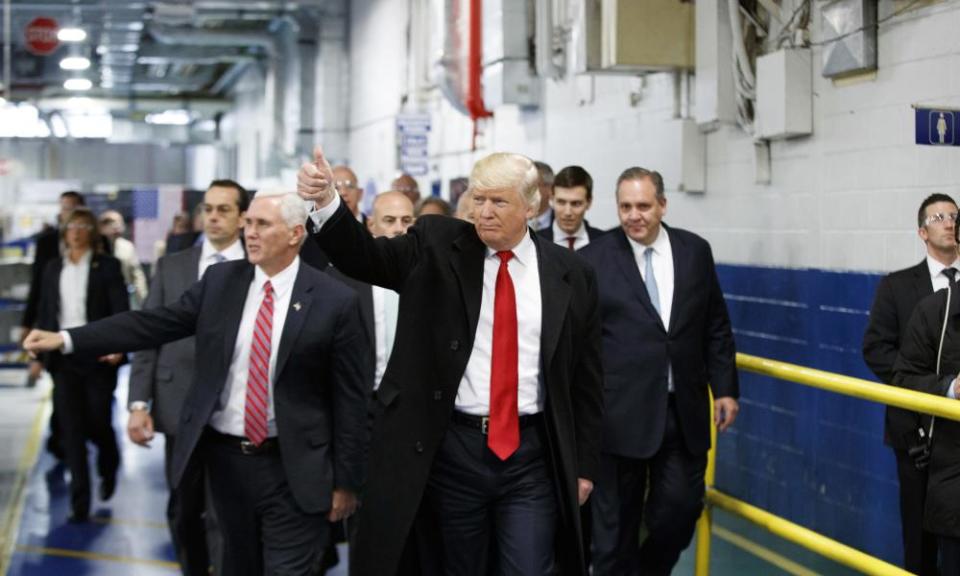What does the business world make of Trump 100 days in? The jury is still out

As we approach 100 days in, business still doesn’t know quite what to make of Donald Trump.
On the campaign trail he excoriated Wall Street and pledged to “drain the swamp” of lobbyists. In office he has stuffed his cabinet full of gilded bankers and hidden the White House guest book so we will never find out who has his ear.
He promised to slash environmental regulation (done), reassess the post-financial crash Dodd Frank financial regulations (doing) and to slash taxes on businesses (pending).
All these things should be pro-business. “Business likes to follow the path of least resistance,” says Peter Henning, law professor and regulatory expert at Wayne State. “He campaigned as a populist president but I’d say that so far the banks sure like him.”
But even more than tax cuts and deregulation, business likes certainty and here Trump’s first 100 days suggest business is out of luck. Trump is also arguably the US’s most protectionist president since Herbert Hoover, a view that may have got him elected but that sends the global elite of Davos into the horrors.
Nor has the president been shy to name and shame those companies that offend him. Trump has used the bully pulpit (mostly via his Twitter account) to lambast companies including GM and Ford for their plans to manufacture overseas. He wiped $1bn, temporarily, off Boeing’s value after threatening to cancel its contract to build the new Air Force One 747.
General Motors is sending Mexican made model of Chevy Cruze to U.S. car dealers-tax free across border. Make in U.S.A.or pay big border tax!
— Donald J. Trump (@realDonaldTrump) January 3, 2017
Even the Kochs, usually every Republican president’s favorite rightwing billionaires, aren’t happy with Trump’s tough talk on trade. The brothers recently financed ads attacking a “border adjustment tax” on goods coming into the US that Trump wants to use to build his “big, beautiful wall” to keep Mexicans out (you may remember it as the one Mexico was going to pay for). The Koch’s ads claim US shoppers will end up paying for that tax in higher prices at Walmart etc.
But having got off to a galvanizing start, there are some signs that Wall Street is no longer glued to Trump’s every word. Repealing Obama rules is one thing Trump has done effectively, but drafting and passing his own – not so much. Talk of tax cuts last week did little for stock prices which rallied after his election (the Trump Bump), but peaked in March and have drifted down ever since.
.@realDonaldTrump .@realDonaldTrump’s actions in his first 100 days have shown his tough talk against Wall Street and big corporations was just that: all talk
— Elizabeth Warren (@SenWarren) April 22, 2017
The administration’s humiliating defeat, at the hands of its own party, over its plans to repeal and replace Obamacare have shown the limits of his authority. When Trump came out in support of Bill O’Reilly, Fox News’s fallen idol, O’Reilly still lost his job. Already some business leaders, even those with terrible reputations (that’s you Uber’s Travis Kalanick) have dropped out of Trump’s business advisory council, lest their proximity be read as approval.
Thanks to the supreme court, corporations are people too and as the fight for equal bathroom rights for transgender people in North Carolina has shown, corporations are increasingly more liberal in their views than the Trump administration. On issues such as the environment, women’s rights, immigration and the treatment of the LGBTQ community, it’s not hard to see companies increasingly siding with consumers and activists against the Trump administration (especially if the president’s poll numbers keep falling).
But while the president may look less powerful 100 days on, business has not forgotten what Potus represents. Rihanna may have 71 million followers on Twitter compared with Trump’s 6.6m but she doesn’t have the nuclear codes. Foreign policy remains the great uncertainty as Trump exits his “honeymoon”. He has softened the rhetoric on China but is still insisting on his border wall, has bombed Syria and made worrying noises about North Korea. One hundred days in, business may be taking Trump a little less seriously at home – for now, overseas issues look more worrying. All that could change in a tweet. This is a president who likes surprises, and business hates surprises.

 Yahoo Finance
Yahoo Finance 